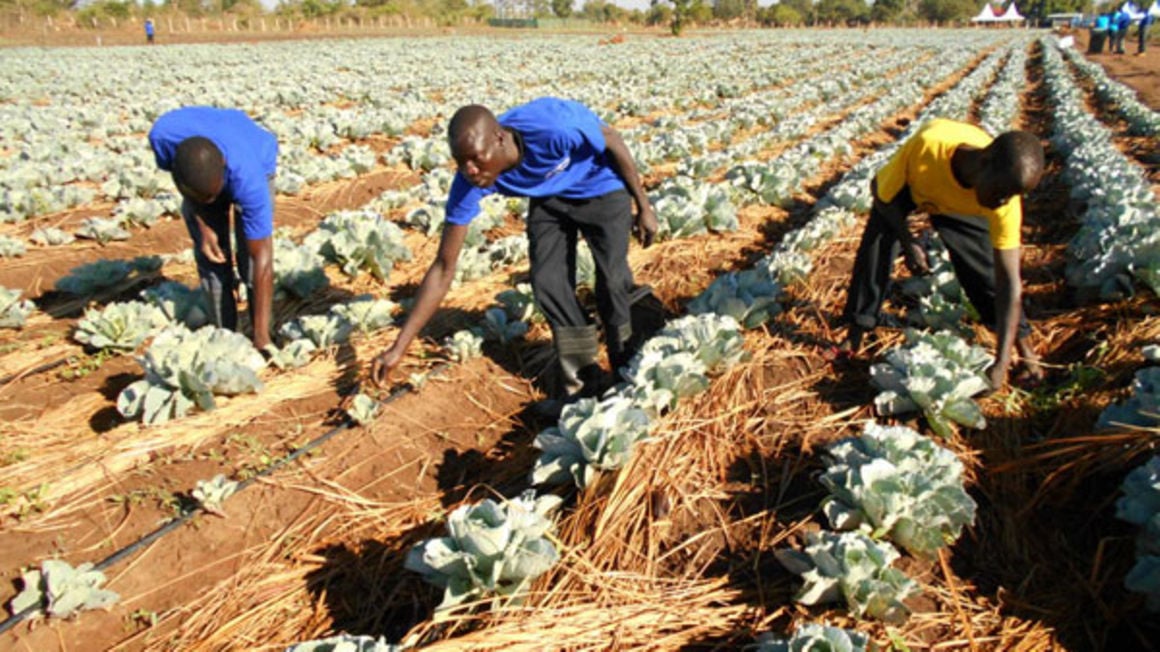
A machine operator demonstrates cassava milling processes on May 16, 2024 at Amoru Amoroto Multipurpose Cooperative Society (AAMCOS) in Soroti District. PHOTO/MICHAEL KAKUMIRIZI
Sixty-six-year-old Ugandan farmer Leonard Oluga gleefully sits outside a newly established multimillion cassava processing plant, patiently waiting for payment for his fresh cassava tubers supplied to Amoru Amoroto Multipurpose Cooperative Society (AAMCOS).
Until three years ago, Oluga explained, his attempts at farming had been horrified by inadequate market, poor post-harvest handling and a discouraging- yet persistent market distortion.
But in 2021, the Soroti District farmer enrolled for the Agriculture Cluster Development Project (ACDP), a $150 million government initiative supported by the World Bank- and implemented by Uganda’s Ministry of Agriculture, Animal Industry and Fisheries (MAAIF) in 57 districts since 2017.

66--year-old Ugandan farmer Leonard Oluga gestures during an interview with Monitor on May 16, 2024. PHOTO/MICHAEL KAKUMIRIZI
Hundreds of farmers like Oluga enrolled for ACDP’s e-voucher system, where they paid less than Shs160,000---through a matching grant--- to obtain pesticides, ten 6 by 6metre postharvest tarpaulins and at least eight bags of Narocass 1 cassava stem cuttings.
“Effective 2021, I have been planting the fast-maturing and high yielding Narocass 1 which I got under ACDP after acquiring subsidized farming inputs like stem cuttings, tarpaulins and pick bags which minimized post-harvest losses,” Oluga said.

A worker prepares to enter a cassava solar drier at Amoru Amoroto Multipurpose Cooperative Society (AAMCOS) in Soroti District on May 16, 2024. The facility is helping farmers to minimize post-harvest storage losses. PHOTO/MICHAEL KAKUMIRIZI
Oluga highlighted that unlike traditional cassava that develops in 1-3 years, the Narocass 1 variety matures in about nine months, marked with a significant increase in his production as he got more than 1,000kgs in one acre- and able to trade with AAMCOS.
Oluga was among the pioneers of AAMCOS at its founding with 45 members in 2004 as a mere farmer group named Gida.
In 2021, the group cum cooperative paid Shs45million in kind for a Shs154.2million ACDP grant, a significant development that grew its membership to 336 agrarians, in addition to placing more than 1,000 farmers in a pivotal position to not only improve their production but also find market for bulked farm produce.
According to AAMCOS chairperson David Odeke, the grant was fully used to acquire a storage facility, solar drier, develop infrastructure and purchase modern milling machines.
“Before, farmers were selling dirty cassava in basins but now we’re able to dry it and then process and package,” he told Monitor on May 16.
‘Doubled production’
On May 16, acting Soroti District Agriculture Officer (DAO) and ACDP focal person Moses Okello Eceku admitted there is “a clear connection between doubled food production and ACDP in the often hunger hit Teso Sub-region.”

Acting Soroti District Agriculture Officer (DAO) and ACDP focal person Moses Okello Eceku speaks during an interview on May 16, 2024. PHOTO/MICHAEL KAKUMIRIZI
Aged 35, Damasiku Parish farmer Harriet Arida, who joined AAMCOS in 2022, said the cooperative’s collective marketing and production capacity -following the ACDP initiative- had helped her overcome what she termed “seasonal hurting.”
“The beauty is that AAMCOS buys or mills our cassava at a standard price regardless of what the market dictates. They grind our dry cassava at Shs1,500 per basin which is cheaper than at other local millers. They also help with storage because you can give them the cassava and pick payment later after they have sold on your behalf,” she explained.

A machine operator sets up a cassava milling machine on May 16, 2024 at Amoru Amoroto Multipurpose Cooperative Society (AAMCOS) in Soroti District. PHOTO/MICHAEL KAKUMIRIZI
Across Soroti District, three other cassava value addition matching grant facilities were set up as part of the multimillion ACDP initiative which had an e-voucher enrollment of over 2,000 farmers, mostly cassava growers.
For 52-year-old cassava grower David Erupu, the community integrated development initiative has expanded their network of customers and sustainably grown their agricultural footprint.
“If it were the traditional cassava, I would not even get half of 1,000 kgs from one acre. Now, we’re able to sale our produce but I even have surplus for my family to get a balanced diet,” he testified.

Amoru Amoroto Multipurpose Cooperative Society (AAMCOS) is one of four major cooperatives that have been empowered into value addition. The cooperative is now able to process and pack cassava flour. PHOTO/MICHAEL KAKUMRIZI
Under ACDP, district authorities have created market linkages for beneficiaries through activities such as trade shows and connections to cross border and local buyers of farm produce like schools and government entities.
‘More of ACDP’
On May 16, AAMCOS leader Odeke listed challenges including water shortages, poor transport, lack of rural electrification and pending certification by the Uganda National Bureau of Standards (UNBS) as obstacles to their aim of becoming a major regional milling hub.
“The other last quarter, we sold 8 metric tons of high-quality cassava flour with each kilogram vended at 3, 000. This quarter, we haven’t sold because we’re now working to get a UNBS quality mark,” he explained.
He also decried the cooperative’s small solar drier which he said has a 400kg capacity limit, drying cassava in 2-3 days- which does not meet increased supply of the crop during peak seasons.

This photo taken on May 16, 2024 shows a general view of Amoru Amoroto Multipurpose Cooperative Society (AAMCOS) in Soroti District. The middle structure is what only existed before ACDP intervened, granting the cooperative Shs154.2million. PHOTO/MICHAEL KAKUMIRIZI
Meanwhile, Eceku furthered direct pleas for extension of ACDP beyond its May 31 end date, noting that the initiative could have left out thousands of farmers who were initially skeptical about the matching grant model.
“There’s a pinch farmers feel because of the contribution, and this inculcates a sense of ownership into the farmers…but then I would propose at least a 10-20% co-funding so that the project is inclusive of our average farmers,” he suggested.
He added: “Generally, this project has uniquely been a rare kind of solution that has tackled farmers’ problems in Soroti District and we yearn for phase II of the project.”

Amoru Amoroto Multipurpose Cooperative Society (AAMCOS) chairperson David Edeku speaks during an interview on May 16, 2024. PHOTO/MICHAEL KAKUMRIZI
However, both Eceku and Odeke are optimistic that existing structures will thrust the initiative forward, essentially, through a multiplier effect.
“We have committees and systems in place to ensure sustainability of the project. Also, we shall extend the trainings we acquired to help other farmers with cultivation and post-harvest handling,” Odeke noted.


